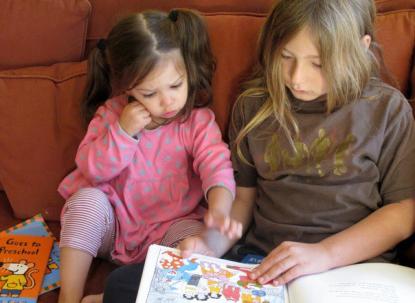Having read every single volume of L. Frank Baum’s Wizard of Oz series—there are fourteen tales, in case you didn’t know—to my three year-old son, a precocious and book obsessed sort, even from infancy, I know that young kids can become completely enamored with the chapter book.
Not to go all Garrison Keillor and claim my child is “above average” or anything, I now have some comparison from within my brood and I can say with confidence that my firstborn’s relationship to books is not the same as most kids’ relationships to books. He’s in a relatively small category of truly lifelong book enthusiasts.
One sign: he has always loved picture books, maintaining that love long after he could read any book on any shelf.
The further I’ve gotten into the experience of parenting young kids and then emerging readers, the more convinced I’ve become that way too many parents rush their kids’ book selections. I find this really sad, mostly because there are so many wonderful books missed by zooming past picture books too soon and then zooming past chapter books aimed at younger audiences, too.
I’ve written about this before, suggesting some favorite (of mine/ours) books many people have never encountered. As I slowed down the pace of what we were reading, taking more time on picture books—including reading favorites more times over—and then exploring some books I’d read before Charlotte’s Web or Stuart Little, I feel that I’ve gotten to enjoy reading so much more with my kids, and somehow that I’ve given a wordless but word-filled message to the emerging reader selves they become: don’t rush. As any early elementary teacher will tell you, reading can become a somewhat competitive pastime when the adjectives connected to books most sought after include thickest or most difficult.
So, it really pained me—a founding board member of the Eric Carle Museum of Picture Book Art—to read in the New York Times last week that picture books are in some peril, in large part because parents want their kids to essentially “hurry it up” to chapter books, hard ones at that. As I’d instinctively chime in along with experts who know more, this seems like the absolutely deadest wrong approach to nurturing readers and book lovers. From the article: “Literacy experts are quick to say that picture books are not for dummies. Publishers praise the picture book for the particular way it can develop a child’s critical thinking skills.”
As for me, parent on the fourth round of picture book reading on my lap, I cannot imagine for a nanosecond why a parent would push or rush or feel impatient, not when there’s Hazel (and her amazing mother) or Emma (in search of her perfect pet) or very lonely fireflies or Lilly and her baby brother Julius or Olivia and her circus saving ways or Peter learning to whistle… (Spot or Maisy, I’ll cede a bit of impatience, sure).
**
After a real tussle of pride over A to Z Mysteries, my emerging reader of the moment settled into every single Nate the Great he could lay his hands on and now that little brother to champion Stink. He is attending to his second grade homework responsibilities—fifteen minutes of reading plus a quick log four times each week—diligently and even cheerfully thus far.
over A to Z Mysteries, my emerging reader of the moment settled into every single Nate the Great he could lay his hands on and now that little brother to champion Stink. He is attending to his second grade homework responsibilities—fifteen minutes of reading plus a quick log four times each week—diligently and even cheerfully thus far.
In a way, though, it’s moments like the one I caught on my camera Saturday morning, when he took his little sister on his lap and read Rotten Ralph to her two times in a row that make me certain the don’t rush advice is pretty brilliant. By taking his time and thus enjoying books, he’s so much more able and willing to pass that affection on to the pint-sized sister.
At the same time, and not to contradict myself, sometimes, she’s completely content to drink her before-bed bottle while I’m reading a chapter book—we made big progress, all the way to those shores of Silver Lake in the Little House series this past spring and early summer before overnight camp—to the next-biggest brother.
I guess the take-home here—for what it’s worth—is that books are to be enjoyed, and ideally, cherished. You may have to prod a going-into-second-grader to gear up for the reading requirements ahead. That gentle summertime nudge—along with permission to make that fifteen minutes “count” even if it’s picture books he’s reading—Remy read and reread a bunch of Olivia books over the summer, plus books he found “easy” like Henry and Mudge and Mr. Putter and Tabby—is, as the early elementary teachers urge their students to gauge, “just right.”


